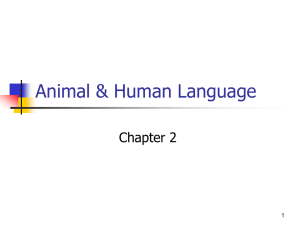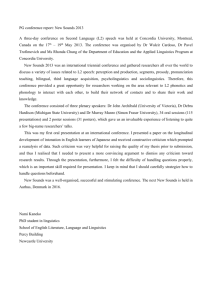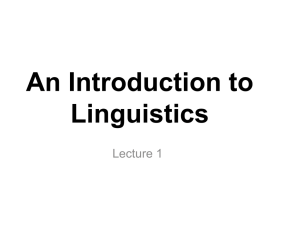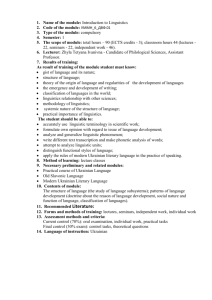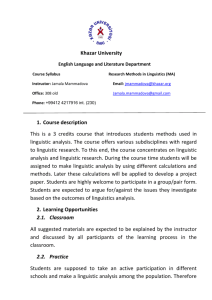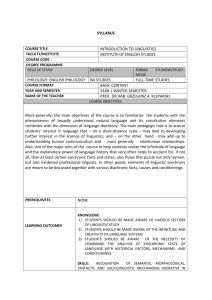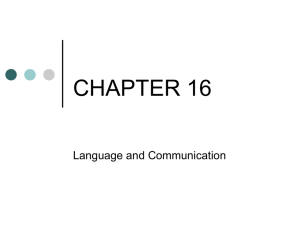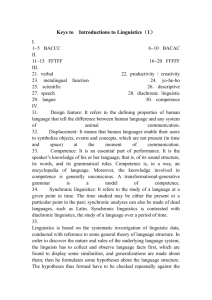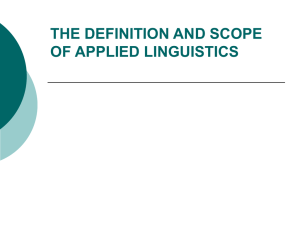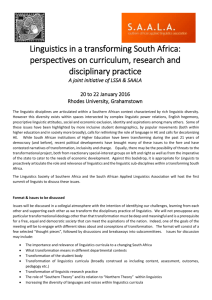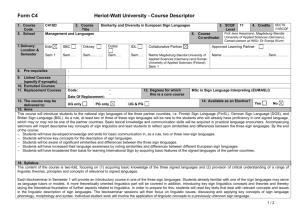Assumptions and Approaches of Linguistics
advertisement
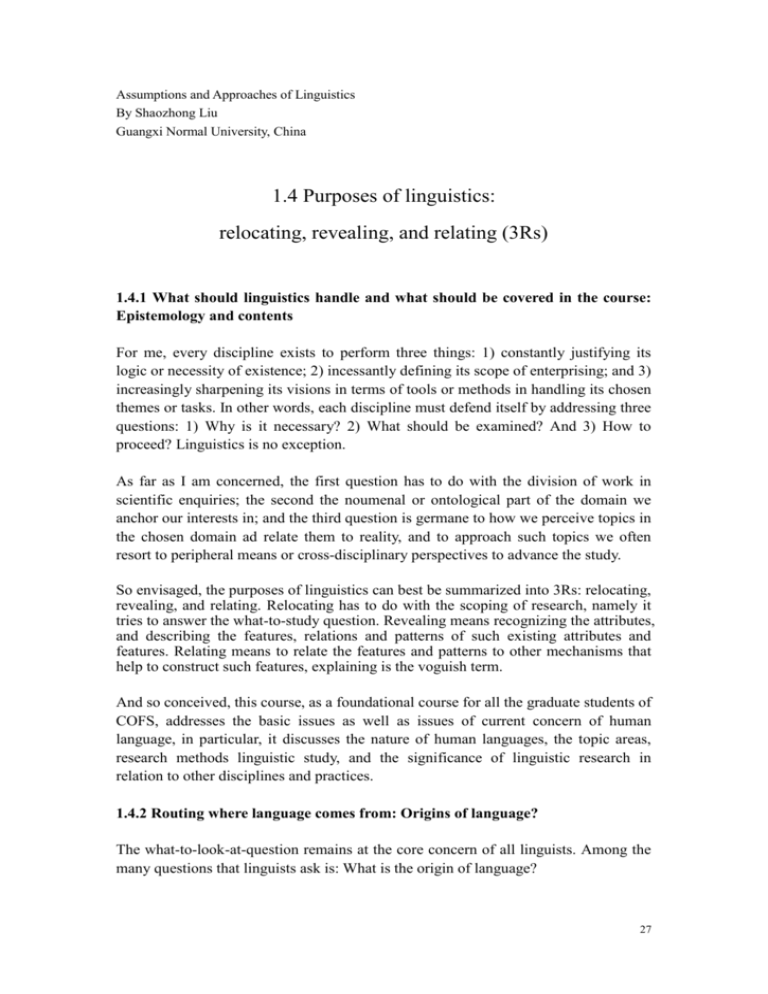
Assumptions and Approaches of Linguistics By Shaozhong Liu Guangxi Normal University, China 1.4 Purposes of linguistics: relocating, revealing, and relating (3Rs) 1.4.1 What should linguistics handle and what should be covered in the course: Epistemology and contents For me, every discipline exists to perform three things: 1) constantly justifying its logic or necessity of existence; 2) incessantly defining its scope of enterprising; and 3) increasingly sharpening its visions in terms of tools or methods in handling its chosen themes or tasks. In other words, each discipline must defend itself by addressing three questions: 1) Why is it necessary? 2) What should be examined? And 3) How to proceed? Linguistics is no exception. As far as I am concerned, the first question has to do with the division of work in scientific enquiries; the second the noumenal or ontological part of the domain we anchor our interests in; and the third question is germane to how we perceive topics in the chosen domain ad relate them to reality, and to approach such topics we often resort to peripheral means or cross-disciplinary perspectives to advance the study. So envisaged, the purposes of linguistics can best be summarized into 3Rs: relocating, revealing, and relating. Relocating has to do with the scoping of research, namely it tries to answer the what-to-study question. Revealing means recognizing the attributes, and describing the features, relations and patterns of such existing attributes and features. Relating means to relate the features and patterns to other mechanisms that help to construct such features, explaining is the voguish term. And so conceived, this course, as a foundational course for all the graduate students of COFS, addresses the basic issues as well as issues of current concern of human language, in particular, it discusses the nature of human languages, the topic areas, research methods linguistic study, and the significance of linguistic research in relation to other disciplines and practices. 1.4.2 Routing where language comes from: Origins of language? The what-to-look-at-question remains at the core concern of all linguists. Among the many questions that linguists ask is: What is the origin of language? 27 Jean Aitchison (1978:29) remarked, “Language, as we have seen, seems to be a highly developed form of animal signaling. But there is a missing link in the chain. How, and when, did we start to talk? This is a problem of interest mainly to ethologists (students of animal behavior), and one which has not yet been solved. Most linguists regard this fascinating topic as being outside the realm of linguistic proper. They are more interested in studying actual language than in speculating about its remote origins.” Hu et al (1992) introduced 4 possible origins: ----The divine-origin theory (God-given language: eg.: Adam calls every living thing and that name comes thereof (Genesis, 2:19). ----The invention theory (= man invents language by imitating sounds, etc) ----The evolution theory (= standing up of man, growth of his lungs and vocal cords / organs, changes his brain size and complexity of his nervous system, develop cognitive abilities, children are born with language and thought) ----The first language hypothesis n experiment (eg.: around 600 B.C., an Egyptian pharaoh (king) named Psammetichus tried an experiment on 2 newborn infants. After staying with a group of sheep and a mute shepherd, the children were reported to have spontaneously uttered, not an Egyptian word, but bekos, a word similar to bread in Phyrygian. It was believed that the children may not have picked up this word from any human source. So Phrygian is the first language. ----Around A.D. 1500, James IV of Scotland carried out a similar experiment. The children were reported to have started speaking Hebrew. George Yule (1991) mentioned the divine theory, the natural sounds source (= words could have been imitations of the natural sounds early men heard around them); the oral-gesture source (= the sounds of language involve a link between physical gesture and orally produced sounds), physiological adaptation (= f, v, th, etc sounds suggest the much more intricate muscle interlacing than is found in other primates), speech and writing (= interactional and transactional link, eg.: cuckoo, ding-dong, wow, ugh, oops) What is the origin of language? Shall we give up the question at the moment or for good, because it is a mystery, as N. Chomsky identified the eligibility of research questions? My suggestion is yes, we can put it aside and concentrate at the moment on the most concrete and accessible questions first. But it does not deny our return to this question in the future, when we have more evidence at our grasp. Nevertheless, it is worthwhile to mention that indeed the origin-question and the like are simply too far for us to see, for after all, our creator’s might in his delicate design of things in the universe is utterly beyond our calculation at the moment. 1.4.3 Other questions under linguistic study Other questions that remain on the list of linguistic enquiry include: What is the 28 nature of language? What can linguistics contribute to the general system of knowledge? How has linguistics come all over the way? What assumptions have set people on the journey of search? How have they launched individual studies to get closer to their raised questions? The list of query may grow and extend. Indeed, the what-to-look-at-question will certainly accompany our growth into futurity of truth-search. To wrap up, the eventual purpose of linguistics is to provide perspectives into the world through looking at the linguistic facts in our daily lives. 29
